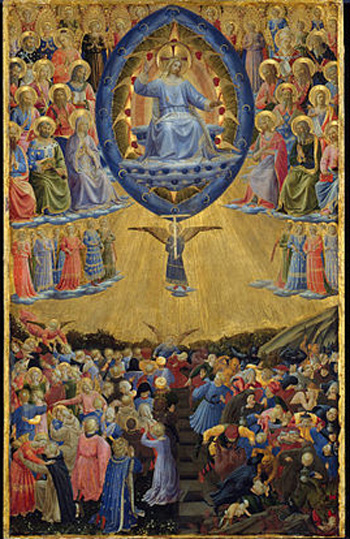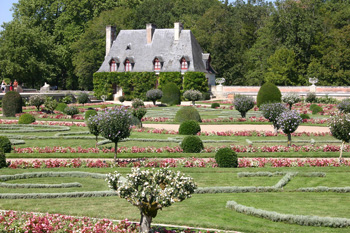Catholic Virtues
 |
 |
 |
 |
 |
 |
 |
True & False Paths to Happiness - XVI
We Assimilate What We Admire
Admiration has a corollary, which is to feel small.
It is a logical consequence. If the one who is admired is more than I am in some point, then I am inferior to that one whom I admire at least in something.
Here enters an important caveat: to feel small – yes, even tiny – but proportionately so. However elevated is the one I admire and however low I might be, the fact that I can look at him and admire him means that he is proportional to me. There is in him something that can enter into me; something that I can assimilate.
Therefore, the fact that we feel small before others should in no way make us sad. On the contrary, we should be enchanted by contemplating a person who is superior to us and we should make that contemplation our joy, a humble and disinterested joy.
 Humble, because we are happy to see a person superior to us and more admirable than we are, to the point of feeling small before him: We should have joy to feel small and be enthusiastic over someone who is more than we are.
Humble, because we are happy to see a person superior to us and more admirable than we are, to the point of feeling small before him: We should have joy to feel small and be enthusiastic over someone who is more than we are.
Disinterested, because we have no role to play in the face of that superiority; we simply look at it and admire in a disinterested way.
Let us say that someone sees another man who has more culture, bearing and style passing by. He perceives that superiority and he assimilates something of that, without copying it.
This assimilation is a true formation. It comes from the inequality of the lesser man seeing and admiring the one who is more. In the act of admiring, he instinctively assimilates what he admires, because admiration produces assimilation.
This is the educational function that the higher class should exercise with the more modest ones.
In short, in admiring one discerns; in discerning he chooses; in choosing he accepts or rejects and, thus, things are defined.
Therefore, what we admire enters into ourselves.
Admiration fills life with interest & joy
Admiration is an affinity among unequal persons. The opposite has a seed of the concept of class struggle between the admirer and the admired.
A French saying affirms that "we always love those who admire us, but we do not always love those we admire." This is human misery!
Whence the question rises: Am I more interested in what I admire than in myself? Or, to the contrary, is my soul preoccupied with myself? And as soon as I see that superiority, do I feel humiliated, envious, aggravated? What is my movement of soul in the face of superiorities?
Note how egalitarian persons are always acid and revolted; cheerful and good souls are always satisfied because they are ready to admire. They know the duty and delight of admiration.
This is why the contact between someone lesser with someone greater, when properly made, gives both a special joy.
 If we have admiration, we will have a permanent paradise in our soul, a fixed, stable and continuous joy, which will accompany us despite any sadness. With the certainty that the depths of reality is not the ephemeral things we see nor the annoyances they can give us, but rather it is this foundation of wonder, this virtuous, admirable, indescribable order of things that exists in Heaven – and also on Earth – in the souls of truly righteous people, which is the charm of our life.
If we have admiration, we will have a permanent paradise in our soul, a fixed, stable and continuous joy, which will accompany us despite any sadness. With the certainty that the depths of reality is not the ephemeral things we see nor the annoyances they can give us, but rather it is this foundation of wonder, this virtuous, admirable, indescribable order of things that exists in Heaven – and also on Earth – in the souls of truly righteous people, which is the charm of our life.
The presence of something very beautiful causes a pleasant sensation in an upright soul with particular emphasis today when the ugly surrounds us on all sides.
What is the result of this pleasant sensation of beauty? This beauty brings us a form of joy that the world today does not know anymore. It is a form of joy linked to admiration. We admire the beautiful object, but in such a focus, in such a light, that it generates joy in us. And while today's world generally conceives joy only in debauchery, in disorder, in the extravagant, in the grotesque, in the ridiculous, in the dissipated, the upright person feels before the beautiful a joy that, so to speak, he can touch with his hands, that he feels in his own soul and that is the result of contemplation.
Admiration fills life with interest and joy. To reject admiration because its weight would be the same as someone saying to an angel who offers him wings: "But I already have a leg and arm and will I then have to carry those wings on my back?"
Oh, you fool! Don't you realize that it is the wings that carry you and not you who carry the wings? When will you learn how things are?
The first element of virtue is admiration
The commandment to love God over all things includes admiring God above all things. For the first element of love is admiration.
Unfortunately, people are taught to practice virtue more than to admire it. Now, in relation to all virtue, it is necessary to have a profound admiration, an admiration that proceeds from reason, from intelligence enlightened by faith. It is after having admiration for virtue that one has the necessary disposition to practice it.
Therefore, it is only after having admired virtue as it should be that you have the proper disposition to practice it.
The continuous exercise of émerveillement
Each work reflects something of its author. This a law that, among men, knows no exception. For example, in music, a trained ear need only a few phrases and he immediately concludes: "It is Mozart!" or "It is Palestrina!"
Evidently, the same is true of the works of God. Therefore, through them, it is possible to know Him.
In each being that one can discern, there is the effigy of Him, so to speak, as one can see the effigy of a king on a coin, albeit of little value.
 Let us imagine a prodigiously rich Queen. She has everything. She suddenly sees a coin rolling on a table in her royal palace. It is the smallest of the coins in circulation in her kingdom, a copper or nickel coin, therefore a non-noble metal. She takes the coin, looks and sees the effigy of her son, the King, whose image is imprinted on it. Looking at the coin she says, "My son!"
Let us imagine a prodigiously rich Queen. She has everything. She suddenly sees a coin rolling on a table in her royal palace. It is the smallest of the coins in circulation in her kingdom, a copper or nickel coin, therefore a non-noble metal. She takes the coin, looks and sees the effigy of her son, the King, whose image is imprinted on it. Looking at the coin she says, "My son!"
This is how we should be in face of the things of God. He put "coins" in circulation in order to be known even in things of no value.
He puts in circulation coins of high value, one of them is the sun. All the stars in the sky are manifestations of the glory of God. But He also put men in circulation, apparently much less glorious than the sun and the stars, yet endowed with immortal souls. And because of this, they look like Him much more than any sun.
God admires the souls He created, and He admires them so much that He died to save them.
Everything we see, therefore, is an exercise in wonder for us. In French it is called émerveillement.
Each thing invites man to imagine what it would be like if it were wonderful.
Small wonders are as necessary as sublime ones
Certain clouds, a very beautiful moonlit night... These are common things in life. But they are filled with great beauty and great values to which man must be very receptive, very sensitive, under pain of not appreciating the highest things.
 One of the things that makes up part of European Civilization is the excellent level of everyday life. It is not just to say, for example, that Europe has the Castle of Chenonceaux. The Castle, without a doubt, is beautiful. But the guardhouse at Chenonceaux, which the Castle completely eclipses, is also beautiful.
One of the things that makes up part of European Civilization is the excellent level of everyday life. It is not just to say, for example, that Europe has the Castle of Chenonceaux. The Castle, without a doubt, is beautiful. But the guardhouse at Chenonceaux, which the Castle completely eclipses, is also beautiful.
Something similar exists in certain English panoramas. A little river runs close to a stone wall, swans swimming in it, ducklings under the little bridge from which hangs a vine with blue or red flowers – these are the little things of everyday life that European Civilization has splendidly understood.
Thus, in certain sense, we need to admire more the little things necessary for man than the wonderful sublime things. Because the small wonders prepare our souls for the sublime.
From the top of his divine sublimity, Our Lord Jesus Christ sets the example by admiring even the minutiae of Creation, like the lilies of the field, to which we have already referred.
At the end of the path of admiration is God Himself
Admiration, which was the starting point of sacral contemplation, is also its end point.
In it we find the sublimity, the excellencies of God above all excellencies, and the end of the road of all sublimities and all excellencies that we considered.
Thus, at the end of the path of admiration is God Himself.
Continued

It is a logical consequence. If the one who is admired is more than I am in some point, then I am inferior to that one whom I admire at least in something.
Here enters an important caveat: to feel small – yes, even tiny – but proportionately so. However elevated is the one I admire and however low I might be, the fact that I can look at him and admire him means that he is proportional to me. There is in him something that can enter into me; something that I can assimilate.
Therefore, the fact that we feel small before others should in no way make us sad. On the contrary, we should be enchanted by contemplating a person who is superior to us and we should make that contemplation our joy, a humble and disinterested joy.

The vassal humbles himself before his lord to affirm his dedication & disinterest
Disinterested, because we have no role to play in the face of that superiority; we simply look at it and admire in a disinterested way.
Let us say that someone sees another man who has more culture, bearing and style passing by. He perceives that superiority and he assimilates something of that, without copying it.
This assimilation is a true formation. It comes from the inequality of the lesser man seeing and admiring the one who is more. In the act of admiring, he instinctively assimilates what he admires, because admiration produces assimilation.
This is the educational function that the higher class should exercise with the more modest ones.
In short, in admiring one discerns; in discerning he chooses; in choosing he accepts or rejects and, thus, things are defined.
Therefore, what we admire enters into ourselves.
Admiration fills life with interest & joy
Admiration is an affinity among unequal persons. The opposite has a seed of the concept of class struggle between the admirer and the admired.
A French saying affirms that "we always love those who admire us, but we do not always love those we admire." This is human misery!
Whence the question rises: Am I more interested in what I admire than in myself? Or, to the contrary, is my soul preoccupied with myself? And as soon as I see that superiority, do I feel humiliated, envious, aggravated? What is my movement of soul in the face of superiorities?
Note how egalitarian persons are always acid and revolted; cheerful and good souls are always satisfied because they are ready to admire. They know the duty and delight of admiration.
This is why the contact between someone lesser with someone greater, when properly made, gives both a special joy.

Heaven is what is most real on Earth
The presence of something very beautiful causes a pleasant sensation in an upright soul with particular emphasis today when the ugly surrounds us on all sides.
What is the result of this pleasant sensation of beauty? This beauty brings us a form of joy that the world today does not know anymore. It is a form of joy linked to admiration. We admire the beautiful object, but in such a focus, in such a light, that it generates joy in us. And while today's world generally conceives joy only in debauchery, in disorder, in the extravagant, in the grotesque, in the ridiculous, in the dissipated, the upright person feels before the beautiful a joy that, so to speak, he can touch with his hands, that he feels in his own soul and that is the result of contemplation.
Admiration fills life with interest and joy. To reject admiration because its weight would be the same as someone saying to an angel who offers him wings: "But I already have a leg and arm and will I then have to carry those wings on my back?"
Oh, you fool! Don't you realize that it is the wings that carry you and not you who carry the wings? When will you learn how things are?
The first element of virtue is admiration
The commandment to love God over all things includes admiring God above all things. For the first element of love is admiration.
Unfortunately, people are taught to practice virtue more than to admire it. Now, in relation to all virtue, it is necessary to have a profound admiration, an admiration that proceeds from reason, from intelligence enlightened by faith. It is after having admiration for virtue that one has the necessary disposition to practice it.
Therefore, it is only after having admired virtue as it should be that you have the proper disposition to practice it.
The continuous exercise of émerveillement
Each work reflects something of its author. This a law that, among men, knows no exception. For example, in music, a trained ear need only a few phrases and he immediately concludes: "It is Mozart!" or "It is Palestrina!"
Evidently, the same is true of the works of God. Therefore, through them, it is possible to know Him.
In each being that one can discern, there is the effigy of Him, so to speak, as one can see the effigy of a king on a coin, albeit of little value.

God puts His effigy even on ‘coins’ of small value; we should discern it in everything & glorify Him
This is how we should be in face of the things of God. He put "coins" in circulation in order to be known even in things of no value.
He puts in circulation coins of high value, one of them is the sun. All the stars in the sky are manifestations of the glory of God. But He also put men in circulation, apparently much less glorious than the sun and the stars, yet endowed with immortal souls. And because of this, they look like Him much more than any sun.
God admires the souls He created, and He admires them so much that He died to save them.
Everything we see, therefore, is an exercise in wonder for us. In French it is called émerveillement.
Each thing invites man to imagine what it would be like if it were wonderful.
Small wonders are as necessary as sublime ones
Certain clouds, a very beautiful moonlit night... These are common things in life. But they are filled with great beauty and great values to which man must be very receptive, very sensitive, under pain of not appreciating the highest things.

The beauty of the Guardhouse, above, is eclipsed by the grandiose aspect of Chenonceaux
Something similar exists in certain English panoramas. A little river runs close to a stone wall, swans swimming in it, ducklings under the little bridge from which hangs a vine with blue or red flowers – these are the little things of everyday life that European Civilization has splendidly understood.
Thus, in certain sense, we need to admire more the little things necessary for man than the wonderful sublime things. Because the small wonders prepare our souls for the sublime.
From the top of his divine sublimity, Our Lord Jesus Christ sets the example by admiring even the minutiae of Creation, like the lilies of the field, to which we have already referred.
At the end of the path of admiration is God Himself
Admiration, which was the starting point of sacral contemplation, is also its end point.
In it we find the sublimity, the excellencies of God above all excellencies, and the end of the road of all sublimities and all excellencies that we considered.
Thus, at the end of the path of admiration is God Himself.
Continued

Posted August 19, 2020





